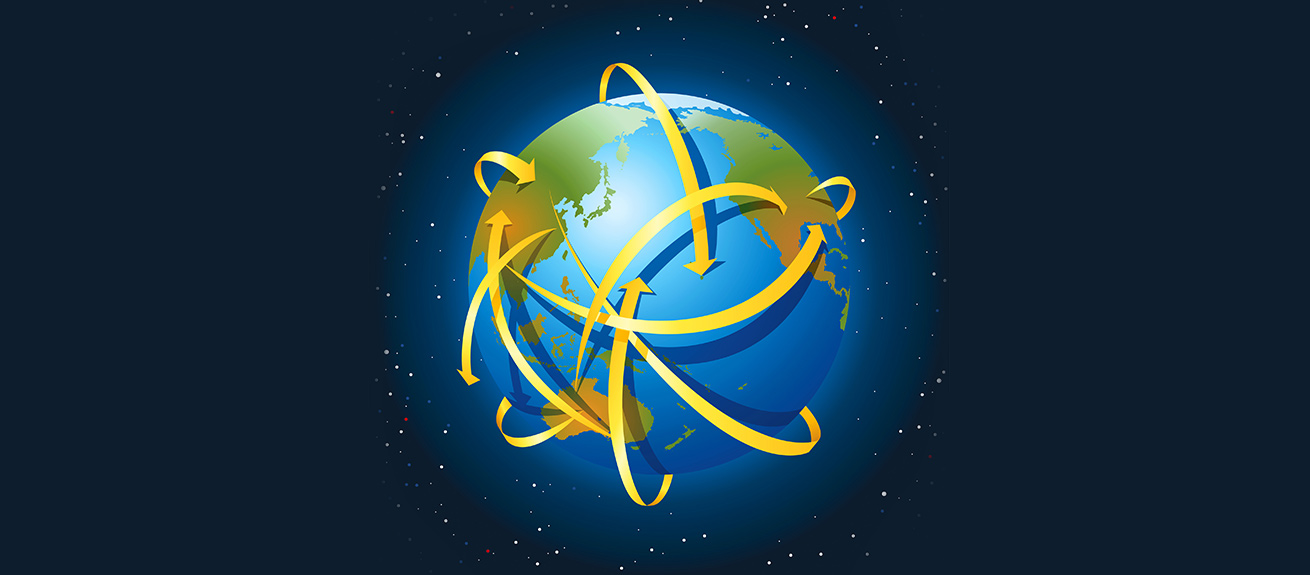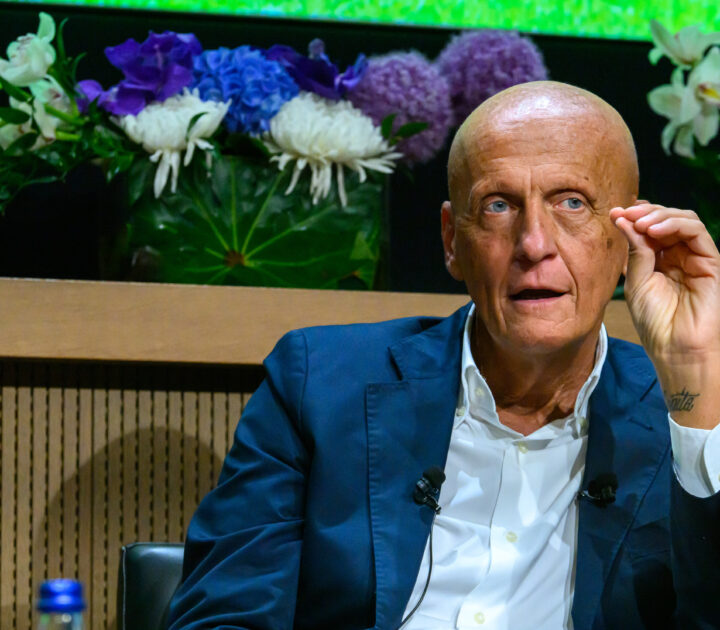The Evian Group@IMD convened a public debate in Lausanne during which five of the nine candidates to become the next Director-General of the World Trade Organization (WTO) outlined their visions for global trade. The event focused on how to rekindle the interest of the private sector in the WTO.
The growing fragmentation of the global governance system and the lingering effects of the global financial crisis have raised questions about the effectiveness and legitimacy of multilateral institutions. The selection of new leaders for key global institutions in recent years – including the IMF in 2011 and the World Bank in 2012 – has focused attention on the role of leaders in the global governance system. The world again focuses on this space as the World Trade Organization (WTO) prepares to appoint a new Director-General to succeed Pascal Lamy, whose second term of office expires on August 31, 2013. The decision of who will be the next Director-General of the WTO, the international organization dealing with the rules of trade between nations, will be vital for global governance in the 21st century. The Director-General’s role is not only to facilitate global trade negotiations that aim to spur growth by removing trade barriers but also to manage an organization that has an important “judicial” rule as the enforcer of multilateral trade rules.
In a globalized world that continues to undergo profound transformations, the importance of strong leadership has never been more apparent. The new Director-General must be a leader with the communication, diplomatic and managerial skills needed to face major challenges, including the question of how to bring to closure the stalled Doha Development Agenda negotiations, also known as the “Doha Round.”
Officially launched in November 2001, the Doha Round is the latest in a series of trade negotiations among the 158 WTO member nations that aims to achieve major reforms of the international trading system by further liberalizing trade and strengthening multilateral trade disciplines. Reaching agreement among all members, 121 of which are developing countries, has proved difficult due to differences between developed and developing countries on issues such as access to agricultural markets, industrial tariffs, services, and non-tariff barriers to trade. Another issue that will require renewed attention concerns the perceptions and engagement of the private sector with the WTO.
Selection process
The selection process for the next Director-General started on December 1, 2012. Nine candidates have been nominated by WTO members, a record in the history of the WTO (and of its predecessor the General Agreement on Tariffs and Trade, or GATT). The new Director-General will not be from Europe or the United States: candidates come from Latin America (Brazil, Costa Rica, Mexico), Africa (Ghana, Kenya), the Middle East (Jordan) and Asia-Pacific (Indonesia, New Zealand, South Korea). In a statistical sense, there is a one in three chance that the new Director-General will be a woman (an outcome that would be a first in the history of the GATT and the WTO). Four of the candidates currently have ministerial rank while three others are former trade ministers of their countries. Moreover, all of them have a substantive trade negotiations background, at either the multilateral or bilateral level.
The selection process is designed to foster consensus-building around one candidate. In theory, these consensus-fostering procedures are based on a “no veto, no vote” culture that puts a premium on political legitimacy. In practice, however, the process provides scope for interpretation and the use of political influence. In the past, the WTO selection process has often led to disputes, notably when Renato Ruggiero (Italy) was selected in 1995 with an agreement that he would be limited to one term of office; and again when Mike Moore (New Zealand) and Supachai Panitchpakdi (Thailand) assumed the DG role for three years each from 1999, with no possibility to extend either term. Since then an attempt has been made to codify the procedures for the appointment of the Director-General, which contributed to the relatively smooth appointment of Lamy in 2005, and his reappointment for another four-year period.
The selection will be facilitated by a troika composed of the Chair of the General Council, and the chairs of the Dispute Settlement Body and the Trade Policy Review Body. The troika will consult with the ambassadors representing the member nations. Diplomats are asked to express their preferences (some do this in an explicit manner, others in a coded style that needs to be interpreted by the troika). Successive rounds of consultations take place until the consensus candidate is identified. The system relies on trust (for example, the troika is not required to disclose the exact support numbers associated with each candidate as the process evolves). The process of selection is expected to be concluded by May 31, 2013.
WTO leadership debate
Against this background, The Evian Group@IMD convened a public debate in Lausanne on January 30, 2013 during which five out of the nine candidates for the position of Director-General presented their visions for global trade and focused on how to rekindle the interest of the private sector in the WTO.
Debate host Carlos Braga, Director of The Evian Group@IMD and Professor of International Political Economy at IMD, said that when CEOs and private sector representatives were asked to play a game of word association in relation to the WTO, a word that often came to mind was “frustration.” This is a reflection of the slow pace of multilateral trade talks, in particular the stalled Doha Round, and also the perception that WTO rules do not address the most relevant trade issues of today – such as the operations of global supply chains and the proliferation of preferential trade agreements.
The five candidates present then began the debate in front of an audience of around 250 that included representatives from the private sector, IMD alumni, representatives from civil society, academia and the Geneva diplomatic community. Although the five candidates agreed that the WTO and the private sector need to engage more closely and regularly with each other, they emphasized different aspects of this relationship in their remarks. Alan Kyerematen, a former Minister of Trade and Industry from Ghana, said the WTO needs to reach out more actively to business – including via a global trade summit. But, echoing some of the other candidates, he underscored that the private sector does not only include large multinational companies. “The private sector is not only the big companies, MNCs, but the small and medium enterprises are a major part of this all over the world… If we are going to make the private sector benefit from the work that we do, then I think that poor communities must have a stake in this.”
Anabel González, the Minister of Foreign Trade of Costa Rica, said that reaching a trade facilitation agreement at the WTO Ministerial Conference in Bali in December 2013 would help to rekindle private sector interest. She added that the WTO should discuss issues of greater relevance to the private sector, such as global value chains. “The private sector has been driven away by long and less relevant negotiations. We need to see how talks can deliver quicker results,” noted González, who previously was Director of the WTO’s Agriculture Division.
Mari Elka Pangestu, former Indonesian Trade Minister who is now Minister of Tourism and Creative Economy, agreed that a trade facilitation deal could ease some of the private sector’s frustration with the WTO. Like several other candidates, she supported the idea of a business advisory panel to discuss trade issues with the WTO. “Business wants tosee some of the 21st-century agenda that affects the private sector being addressed. So there needs to be dialogue,” she said.
Tim Groser, New Zealand’s Minister of Trade, said the private sector will show much more interest in the WTO when it sees evidence of real momentum in multilateral trade talks. “The problem lies with us. We have to develop momentum, and then business will come. And we will need business support to get any agreement through,” said Groser, who is also his country’s Minister for Climate Change Issues and Associate Minister for Foreign Affairs.
Amina Mohamed, Kenya’s former WTO Ambassador, said the WTO has not lost the private sector, despite the current frustration. “The private sector and the WTO are partners, and a divorce couldn’t happen even if we tried. Trade is an engine for growth, and business is interested in predictability, stability and open markets. And that can only be provided at a multilateral level through the WTO,” she said.
Alejandro Jara, a current WTO Deputy Director-General, drew three lessons from the experience of WTO–private sector relations during the last eight years in which he has held this position. First, the private sector is always interested and active in the final stages of trade negotiations, “but they won’t waste time coming here if an agreement is not likely.” Second, the WTO can do better at communicating the possible impact of agreements and rules on business. Third, private sector associations should consider increasing their presence in Geneva to gain a better understanding of what’s going on at the WTO.
The other four candidates for WTO Director-General are Roberto Carvalho de Azevedo, Brazil’s current ambassador to the WTO; Herminio Blanco, Mexico’s former Minister of Trade and Industry who was his country’s chief negotiator for the North American Free Trade Agreement (NAFTA); South Korea’s Trade Minister, Taeho Bark; and Ahmad Thougan Hindawi, a former Industry and Trade Minister of Jordan.
A leader for the future
In the next WTO Director-General, the international community is looking for a leader who will not only be able to exercise intellectual leadership and diplomatic skills in advancing the multilateral trade agenda but who is also a good communicator with strong managerial skills. The complex challenges ahead include bringing to closure the Doha Round, disciplining the evolving wave of preferential agreements, and rekindling the interest of the private sector in the WTO.
After a comprehensive selection process, one of the nine candidates will be chosen to lead the WTO and the announcement will be made three months before the appointment begins. What should he or she do within the first 90 days of taking office? The new Director-General will need to pay attention to three critical dimensions in his or her first 90 days: Securing early wins, laying a foundation and articulating a vision.4 Getting off to a good start is critical for building momentum toward improving the effectiveness and legitimacy of one of the most important pillars of the global governance system.
Professor Braga closed the debate by observing that multilateral trade rules are central to global economic integration and sustainable development. But he also highlighted the challenges that the next Director-General will face in realizing his or her goals: “There is an embarrassment of riches in terms of the number of qualified candidates applying for the role, and all of them have a vision for the WTO. But vision without implementation is hallucination, and we hope the next Director-General will be able to transform many of the ideas debated here today into reality.”






